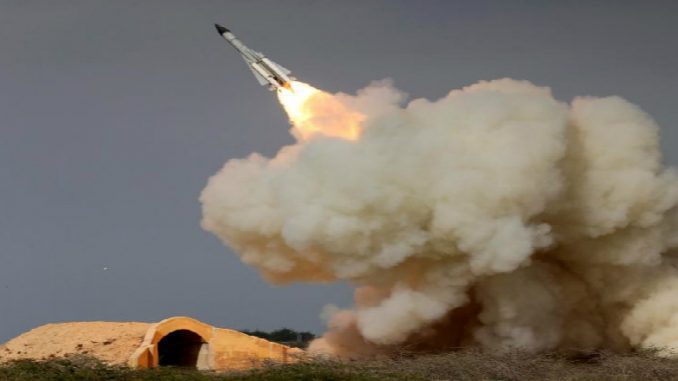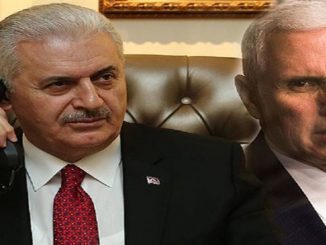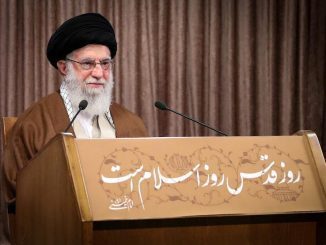
Iran launched military drills on Saturday, in a clear challenge of the new sanctions that were imposed by the US administrations against the republic.
Iran’s Revolutionary Guard Corps launched military drills on Saturday and tested new missile and radar systems.
Iranian state news agencies reported that home-made missile systems, radars, command and control centres, and cyber warfare systems would be tested in Saturday’s drill.
In a statement posted on its official website, the elite military body said the maneuvers in the northeastern province of Semnan were aimed at demonstrating Iran’s “complete preparedness to deal with the threats” and “humiliating sanctions” from the White House.
“We are working day and night to protect Iran’s security,” head of Revolutionary Guards’ aerospace unit, Brigadier General Amir Ali Hajizadeh, said to a local news agency, as reported by Reuters news agency.
“If we see [the] smallest misstep from the enemies, our roaring missiles will fall on their heads.”
Iran’s Revolutionary Guards said an exercise on Saturday would see short range missiles with a range of up to 47 miles deployed.
These develpoments came after the US Treasury Department said it had published a list of 13 people and 12 entities facing new sanctions.
Some of the individuals and entities involved in the US sanctions are based in the United Arab Emirates, Lebanon and China.
“This action reflects the United States’ commitment to enforcing sanctions on Iran with respect to its ballistic missile program and destabilizing activities in the region and is fully consistent with the United States’ commitments under the Joint Comprehensive Plan of Action,” the US Treasury statement said.
How the relationship worsened in a week
Barack Obama, The former US leader, was behind the historic Iran nuclear deal with P5+1 powers, agreed upon last year, which saw Tehran agree to amend its nuclear output in order to lift all nuclear-related economic sanctions, freeing up tens of billions of dollars in oil revenue and frozen assets.
After lifting the sanctions, Iranian president Hassan Rouhani visited Europe and made deals that worth billions of dollars. European companies started looking for investment opportunities in the growing Iranian market.
However, Trump’s election might change the whole game and threaten the development that was built in the past months.
Trump has said during his election campaign that the deal as “disastrous” and said it would be his “number one priority” to dismantle it.
These threats became clearer after Trump’s inauguration, as he signed an executive order temporarily barring thousands from seven countries in the Middle East and Africa, including Iran, from obtaining visas to travel to the United States.
In a clear challenge, a ballistic missile test was conducted by Iran on Sunday.
A U.S. defense official said that the missile test ended with a “failed” re-entry into the earth’s atmosphere, and later German sources said that the test included nuclear-capable missiles that are considered a breach of the nuclear deal.
After that Trump announced that “we’re officially putting Iran on notice”
A U.S. defense official said that the missile test ended with a “failed” re-entry into the earth’s atmosphere, and later German sources said that the test included nuclear-capable missiles that are considered a breach of the nuclear deal.
After that Trump announced that “we’re officially putting Iran on notice”, and declared new sanctions against Iran later.
Iran’s response and the long-awaited chance
Iran is likely to calibrate its responses based on how the U.S. acts.
Tougher U.S. sanctions could convince Tehran to start reinterpreting the terms of the nuclear deal, said Mohammad Marandi, a political analyst in Tehran.
“The Iranians will reciprocate,” he said. “The more the Americans disregard the agreement … the more the Iranians will find new ways of interpreting the text that do not work to the benefit of the United States.”
Ali-Akbar Velayati, the foreign adviser of Ayatollah Ali Khamenei, Iran’s supreme leader, predicted this week that “the US will be the final loser”.
“It is not for the first time that a naive person from the US poses threats to Iran,” he told state media.
“Our missile drills are a show of our might,” added Tehran Friday prayer leader Ayatollah Ahmad Khatami. “We are living in a world of wolves – wolves such as the arrogant government of America. In this world of wolves, should we remain unarmed and they do whatever damn things they want? No way! This will never happen!”
More direct action could include an uptick in harassment of U.S. warships by Revolutionary Guard speedboats in the Gulf, or new cyberattacks like one that crippled the network of Saudi Arabia’s state oil company in 2012.
Iran also could boost support for regional allies such as Lebanon’s Hezbollah or the Houthis in Yemen.
In addition, this war can be the political victory that the hardliners have sought since te nuclear deal
Iranian Supreme Leader Ali Khamenei regularly criticizes the United States and the deal, saying it should not be trusted and it wasn’t doing its part of the deal.
Khamenei has already promised to “set fire” to the nuclear deal if the West violates it. and has repeatedly complained it has not received benefits promised.
Trump’s war on Iran would just prove him right and will strengthen his hold on the Iranians’ minds, who will just see the west as the devil their leader always spoke about.



